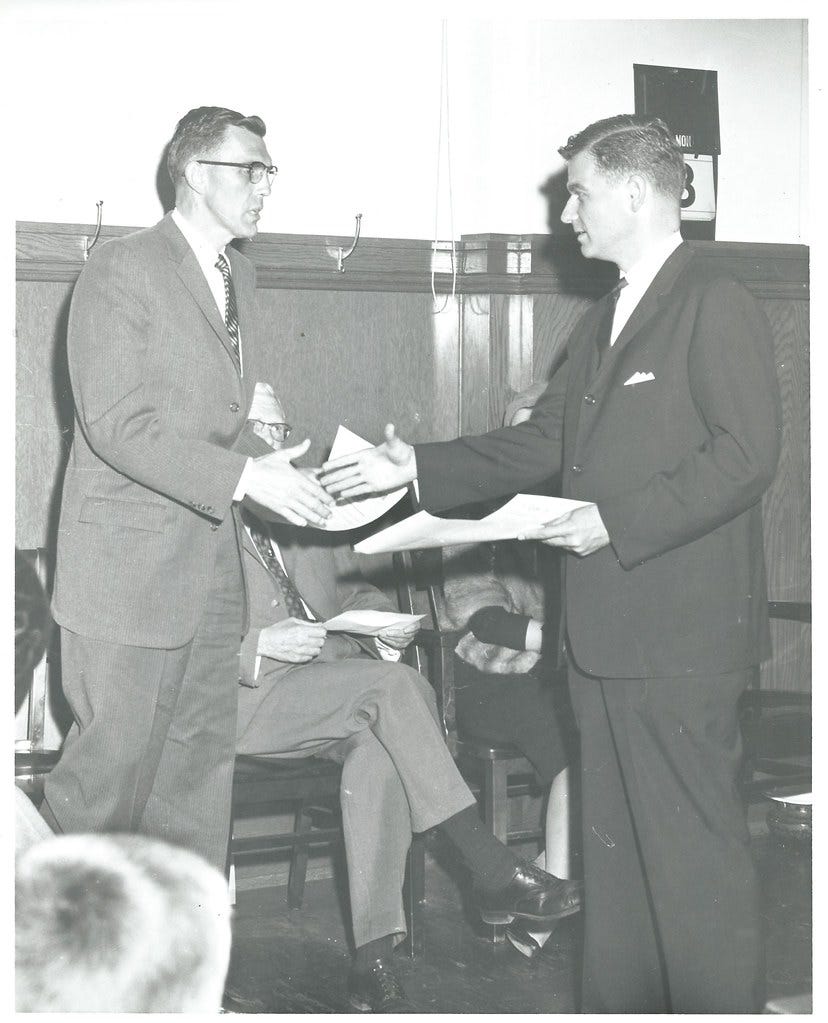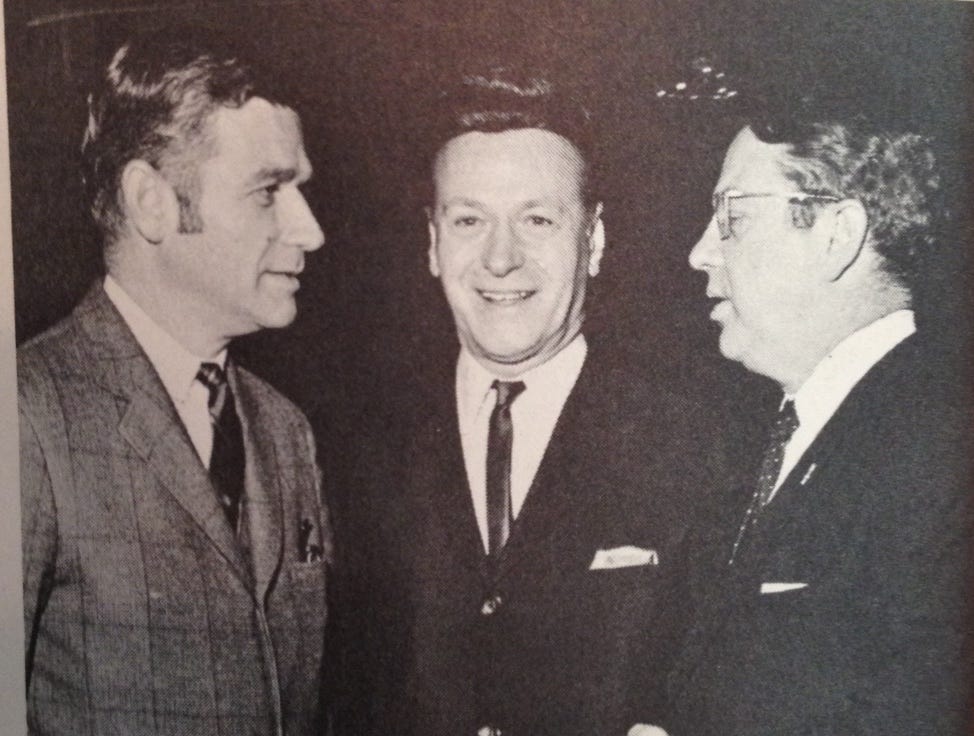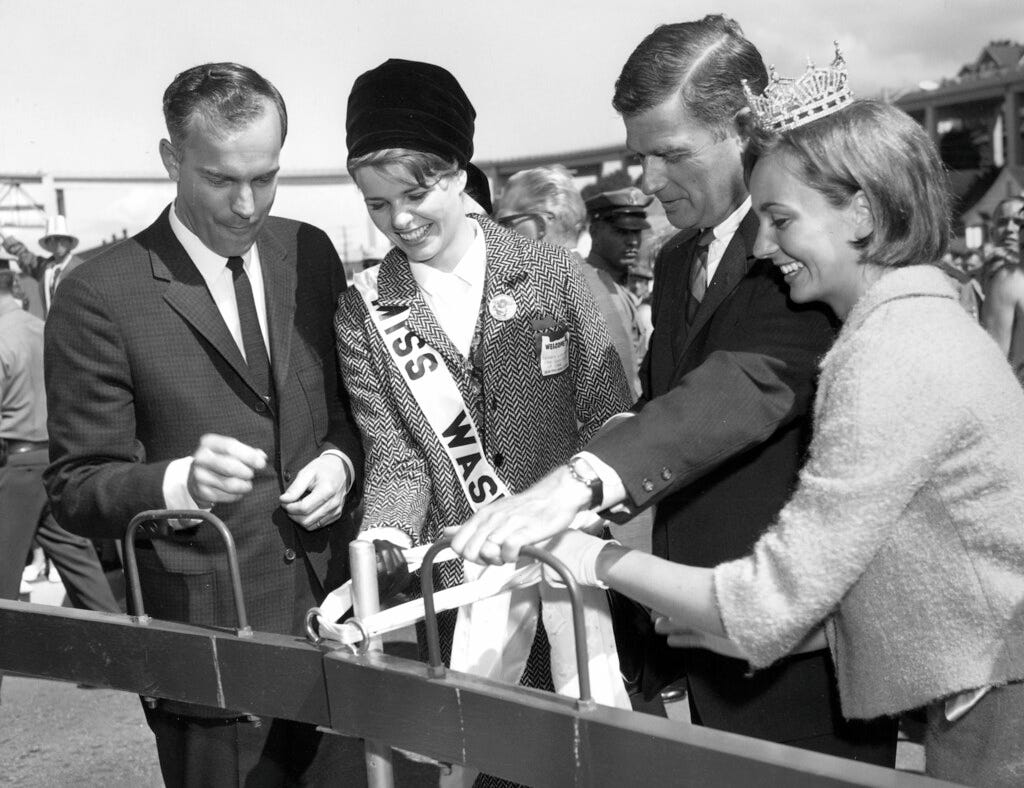Ron Paradis: Politics should about people, not parties
"People aren’t Democrats or Republicans, they’re people. Party affiliation of my constituent is so far down my list of priorities it is almost invisible," remarked Mark Hatfield.
Born and raised in Oregon, Ron worked at colleges out of state for 10 years; he returned home and spent 28 years at Central Oregon Community College.
Hatfield: a true Oregon hero

In June of 2000, I was thrilled to be hosting my idol, former Oregon Governor and U.S. Senator Mark Hatfield, at Central Oregon Community College. He graciously agreed to serve as the Commencement speaker that year. It was our school’s 50th anniversary and I had recommended Hatfield to deliver the address, both because of his history with community colleges in Oregon, and because he was my personal hero and someone who had a significant influence on my political and social values.
I was born in Oregon in 1955, three years before Hatfield was first elected governor. He served in that role for eight years and then in the United States Senate for 24 – he was a major political figure throughout my first four decades of life as an Oregonian.
Our first encounter came while I was on my high school’s student assembly committee and wrote a letter asking him to speak at our school. My fellow students were likely more excited about the magician that performed that year, but I was stoked to get to meet and hear from Senator Hatfield. I was a bit of a political nerd and while I may not have been able to articulate why I was such a strong fan, over the next several years I more fully realized those reasons.
To help me formulate my thoughts for this piece, I reread the autobiography, Against The Grain: Reflections of a Rebel Republican, which Hatfield wrote with Diane Solomon. Doing this confirmed two areas which continue to impact my thinking today – 30 years after he left public life and nearly a decade following his death.
The first is his reverence for life, a belief that influences topics ranging from the death penalty and war to poverty and health care – and, yes, even abortion. This is where I have realized how much of my deep held beliefs are similar to those of Senator Hatfield. That, however, is not the purpose of this piece, so his convictions on those topics will have to wait for another opportunity to share.
What it means to embody the Oregon Way

The second is the purpose of this post and relates to the rationale for this blog: Senator Hatfield, I believe, was and continues to be the epitome of The Oregon Way. When I look at what is happening in our nation, our state, and even our communities—moving away from working together to solve problems and instead toward intense partisanship, I am compelled to reflect on Hatfield’s entire career, beginning as early as his first run for office.
“We never asked political affiliation – even then, bipartisanship was the point,” he said in the autobiography when talking about his 1950 run for the state legislature. “I dreamed of representing all my constituents, not just Republicans. What an absurd form of representation that would be, listening only to those in your party. People aren’t Democrats or Republicans, they’re people. Party affiliation of my constituent is so far down my list of priorities it is almost invisible.”
This bipartisan or, perhaps, even nonpartisan philosophy guided Hatfield throughout his political career.
“People didn’t elect us to act like school children,” he wrote about his time in Washington, D.C., “dividing a line down the playground with friends over here, enemies there. Our legislative process will only degenerate further if we don’t pull ourselves out of this hapless partisan rut and work together.”
Quotes like these stuck with me and further endeared me to Hatfield. When I finally had the chance to sit down with him, I was quickly reassured that Hatfield’s mentality was more than just words on a page. A few months prior to the publication of the book, on the afternoon before the COCC Commencement ceremony, I was addressing the graduates at the rehearsal. As I was running through the order of events for the next day, a woman I knew who was sitting in front row asked me who the speaker was going to be. I told her, but I didn’t like her response; “Is he a Democrat or a Republic?” she asked. I hesitated because I knew her political leanings and knew what her reaction would be. I said he was a Republican, but then added “but that doesn’t matter.” The next morning, I started to tell this story to Senator Hatfield. When I told him what she asked me, he interrupted and said, “She doesn’t get it. It doesn’t matter.” He then told me about his campaign managers and other great supporters who came from the Democratic Party.
Party didn’t matter to me, either. Although I have been a Democrat for the last 30 years, I signed up as a Republican when I first registered to vote, in 1973. I felt the party – mostly, I’m sure, based on my admiration of Senator Hatfield – would best represent me.
I still think that Senator Hatfield and the ideals he stood for have the power to unite people across the political spectrum. He believed it too. In his book, Hatfield told the following story. At the 1964 Republican National Convention in San Francisco, he gave the keynote address. In it, he called out “the venom of hate".” He specifically called out the Communists, the Ku Klux Klan, the John Birch Society “and any like them.” Some of the delegates booed him, which he claimed was “the first time in history any keynoter was booed by their own convention.” His reaction – “I knew our party was, and still is, plenty big enough for diversity.”
A role model first, then a politician

Again, Hatfield was much more than his words. He lived his ideals. Throughout the book, as he shared his experiences both in Salem and in Washington, D.C., I was continually impressed with his passion for working together with Democrats as much as Republicans. In particular, he talked about his relationships with two ardent members of the opposite party – Senators Ted Kennedy (D-Mass) and John Stennis (D-Miss). The relationships were reciprocal. On the jacket for the Against the Grain book, by way of example, there are tributes from both of the major party candidates for president in 1996 – Bill Clinton and Bob Dole.
Unfortunately, if Senator Hatfield were alive today, listening to the political “leaders” in the country, I think he would question whether either of the two parties are interested in being as open to all. I see them instead continuing to close ranks and work on excluding those who are not in lockstep with their beliefs. I know there are many others throughout the state and the country who would join us in working toward a more cooperative and productive environment to solve the pressing problems we face. I know there are others ready to follow the Oregon Way.
*****************************************
Keep the conversation going: Facebook (facebook.com/oregonway), Twitter (@the_oregon_way)
#52


